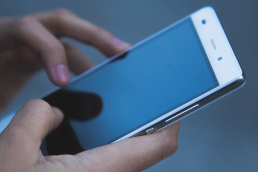“ I wasn’t as stressed as much as I usually am,” said one 15 year youth a little sheepishly as he was the first to report back on the class experiment with not using a smartphone or TV for 24 hours. He had managed to quit for 9 hours.
“ I did more homework and that helped at school the next day,” said another young man gaining courage from his classmate.
“ I got to sleep quicker and slept better too” said a girl who was used to looking at her phone till the wee sma’ hours in the morning.
There was hushed amazement from many of the others who had decided they didn’t need such an experiment.
“ I had to watch ‘Made in Chelsea,’ said one lad, “ I couldn’t wait to find out what happened between…”
“ I had to keep checking my phone just in case my mum might be trying to contact me,” said another young woman acknowledging meanwhile that this was a lame excuse. They had been asked to involve their parents in the experiment.
These are some of the reactions from 14 and 15 year old pupils at a secondary school in Edinburgh in the past few weeks following their attempt at a 24 hour screen fast. Most were only able to go for as little as 4 hours before succumbing to the urge to find out what was going on elsewhere.
The aim was to make the pupils aware of how readily they turn to their phones for stimulation as soon as they get bored or feel anxious. It was not to discourage the use of phones long term. Rather it was to help pupils understand that there are other more healthy and useful ways of relieving boredom or anxiety than turning into non-stop entertainment and electronic stimulation. Words alone can’t convey the lesson, they have to experience it for themselves.
The Reward Foundation did a little survey at the start of the process by way of a simple questionnaire. The results showed the following:
- 83% interacted with their phone for an hour on average before going to sleep;
- 55% looked at it on waking up usually for about 15 minutes;
- 7.4 hours was the average number of hours of sleep, longest 9 hours, shortest 4 hours; the number of hours of sleep for adolescents recommended by doctors is an average of 9 hours;
- 63% said they slept well, 31% said they did not sleep well and 6% were unsure;
- Asked if they felt they were using the phone too much, 51% reported “yes”, 44% “no” and 5% were “unsure”. Some of those reporting “no” were amongst the heaviest users.
- One pupil said he used it for 14 hours a day at the weekends. All pupils used the phone more at the weekends than during the week.
Teachers were dismayed at the level of resistance amongst pupils to even try this experiment. They are looking to extend the exercise to other classes and years.
Interestingly one pupil reported that her parents removed the smartphone at 9.30pm every evening. I wonder how many pupils would prefer it if their parents gave them some boundaries regarding their phone use?




